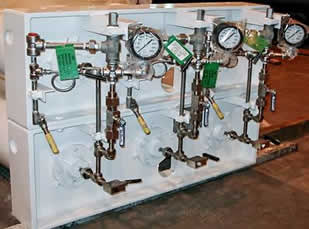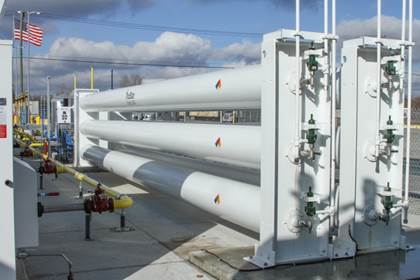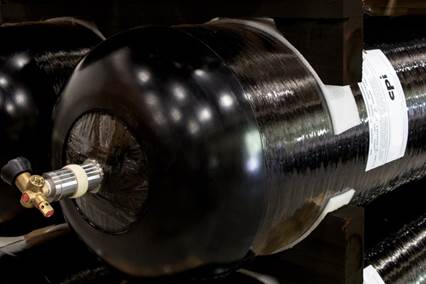By CP Industries, Inc.
1897
When Christy Park Plant was built in 1897 on the old Penney Farm, in McKeesport, Pennsylvania, it consisted of a single main working building and one small office building. It was designed to manufacture seamless steel tubing and small compressed gas cylinders. Christy Park’s new equipment could make larger and stronger cylinders by hot forging—either cupping and drawing a round steel plate or by hydraulic piercing of a solid steel billet to form a seamless cylinder. Within a year, about 125 employees were producing 50-pound carbon dioxide cylinders, the first seamless steel pressure vessels.
Military Partnership
Within that first year, however, fate, in the form of the Spanish American War intervened. The company was found to be ideally suited to manufacture munitions. Beginning with the manufacturing of armaments for Teddy Roosevelt’s Rough Riders, in Cuba, the company continued to arm our nation’s military until the close of the Vietnam War in 1975. Overall, the contributions from a little mill in a little town were truly amazing. During World War II alone, the company contributed over 22.6 million shells, 3.7 million bombs, 1.3 million rocket tubes and motors, and a million cylinders and air flasks.
Constantly Innovating
 In between periods of gearing up to supply our military, Christy Park invested in its cylinder manufacturing processes with pioneering developments in engineering, in equipment, new buildings, and new machinery. Through the infancy of cylinder production, much of the manufacturing technology that became standard within the industry was developed by the plant’s own engineers, and much of the necessary machinery and equipment was built in their own shops. In 1910, for example, the company built a machine to spin the necks of compressed gas cylinders—a technology that is still in use today.
In between periods of gearing up to supply our military, Christy Park invested in its cylinder manufacturing processes with pioneering developments in engineering, in equipment, new buildings, and new machinery. Through the infancy of cylinder production, much of the manufacturing technology that became standard within the industry was developed by the plant’s own engineers, and much of the necessary machinery and equipment was built in their own shops. In 1910, for example, the company built a machine to spin the necks of compressed gas cylinders—a technology that is still in use today.
Christy Park’s versatility and resourcefulness helped the company prosper, as it installed equipment for welding and assembly operations in the manufacture of low-pressure gas tanks. Commercial demand for cylinders was based on industry’s expanding need for on-site ground storage of an ever wider variety of compressed gases. This growing industrial market required cylinders for transporting those gases from source to consumer, and Christy Park worked with manufacturers of gas carrying equipment such as truck trailers and railroad cars to develop safe and efficient methods. In fact, Christy Park designed and built the first trailer unit using large OD “jumbo” tubes, proving their viability. As ASME, ICC and DOT created and revised their regulations and specifications, Christy Park played a major role, providing the basis for many of those agency’s specifications and regulations.
For NASA, Christy Park’s strong and dependable cylinders were the perfect solution to storing critical gases at high pressures at launching sites. The plant supplied a host of cylinders for ground support storage and energy systems for the Atlas, Titan and Jupiter launching facilities. Christy Park was a very big part of Alan Shepard’s sub-orbital space flight, John Glenn’s orbiting of the earth, and Neil Armstrong’s trip to the moon. Today, every NASA launch site depends on Christy Park pressure vessels for the storage and supply of critical gases.
Along with Navy flasks and NASA vessels, the plant’s cylinder markets continued to manufacture ASME storage units for industrial gases, DOT cylinders for gas transportation truck trailers, and aerospace, petro-chemical processing, construction, food production, industrial controls, medicine, power generation, undersea exploration, and oil and gas production.
The Change to CPI
In the early 1980s, as the domestic steel industry fell into a period of retrenchment, Christy Park’s parent company U.S. Steel began a restructuring, eliminating some of its smaller operations. Christy Park was purchased on July 31, 1986 by Stanwich Partners of Stamford, Connecticut, and renamed CP Industries, Inc. Because all of the plant’s experienced management and production people remained with the company, a successful re-birth of the company was possible. That re-birth resulted in a dramatic increase in productivity, and two years later CPI became a part of Chatwins Group, comprised of independent divisions that offer a broad range of fabricated and machined industrial parts and products.
A Commitment to the Future
 In domestic markets, CP Industries has a large stake in the development of alternate fuels for vehicles. Today, CP Industries is a global supplier of pressure vessels for a safe and reliable way to transport and store an ever growing variety of pressurized gases and fuels. From ground storage for refueling stations, to on-board cylinders for vehicles or tube trailers for transporting fuels and gases, the company can deliver top quality, highly engineered storage solutions for an array of applications.
In domestic markets, CP Industries has a large stake in the development of alternate fuels for vehicles. Today, CP Industries is a global supplier of pressure vessels for a safe and reliable way to transport and store an ever growing variety of pressurized gases and fuels. From ground storage for refueling stations, to on-board cylinders for vehicles or tube trailers for transporting fuels and gases, the company can deliver top quality, highly engineered storage solutions for an array of applications.
The growing interest and market demand for light-weight, cost effective storage solutions has created opportunity for new ideas and solutions. The company has designed a line of Type IV all-carbon cylinders for passenger and commercial vehicles, public transit, refuse trucks and other on-board vehicle storage applications. These cylinders are tested and qualified in accordance with ANSI/NGV2 (2007) and are FMVSS 304 compliant. Available in a variety of diameters and lengths, these cylinders are manufactured with a seamless non-metallic strap or neck mount liner, full carbon fiber wrap and PU end caps for added drop protection. When weight and cost savings with increased payload and vehicle range are essential, these fully-composite cylinders are an ideal solution. The company’s Type IV all-carbon cylinders provide a high volume to weight ratio, while maintaining high durability with safe operation of utmost concern.
Today, there is an emerging need for various Hydrogen storage applications at pressures up to 15,000 psi (1034 bar) in the industry. Designs that address the demands of lowering $$/kg of hydrogen stored, and that incorporate life cycle requirements of industry standards are vital. CP Industries stands ready to meet the challenge. Type 1 (all steel) vessels designed for the required higher pressures of Hydrogen are manufactured to ASME, Section VIII, Division 3 standards. The company’s skilled engineering team can work in conjunction with end users in determining pressure cycles and design a compatible solution.
 Besides the traditional Type 1 (all steel) vessels, CP Industries has the capability of utilizing its existing Type 4 (full composite) technology for Hydrogen storage. The vessels are designed and manufactured to the ASME, Section X, Class 3 specification. The company’s designs adhere to NFPA 2 requirements and incorporate high flow piping manifolds, valves, flanges, paint systems and seismic bracing as well as certifications for use in a variety of countries. Assemblies can be customized with any number of vessels of different pressures to meet end user cascade banking demands. CP Industries can assist with valuable technical assistance on installation techniques, and provide continuing support after the system is on line.
Besides the traditional Type 1 (all steel) vessels, CP Industries has the capability of utilizing its existing Type 4 (full composite) technology for Hydrogen storage. The vessels are designed and manufactured to the ASME, Section X, Class 3 specification. The company’s designs adhere to NFPA 2 requirements and incorporate high flow piping manifolds, valves, flanges, paint systems and seismic bracing as well as certifications for use in a variety of countries. Assemblies can be customized with any number of vessels of different pressures to meet end user cascade banking demands. CP Industries can assist with valuable technical assistance on installation techniques, and provide continuing support after the system is on line.
CP Industries continues to change, adapt and invest in its future by investing in new technologies, facilities and, most important, in people. The company is still the leading producer of large OD seamless pressure vessels and is one of only five companies in the world with the equipment and knowledge to produce them. Only CP Industries brings a history of 120 years of pioneering experience in pressure vessel productionand compressed gas technology.
